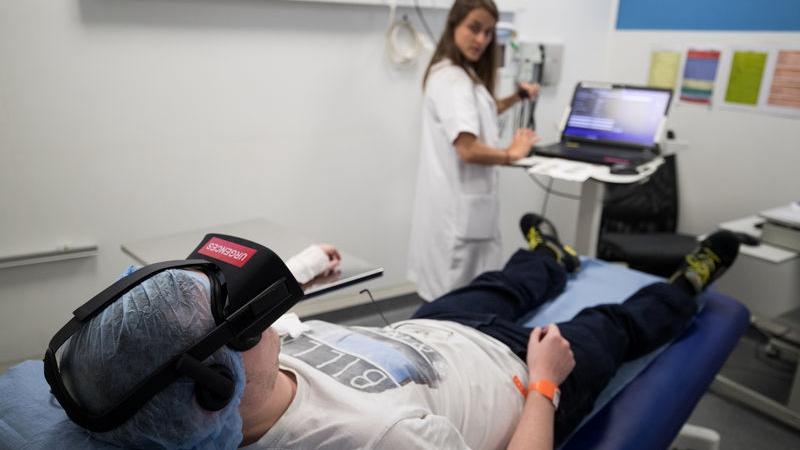
VR
11:01, 10-Jun-2018
French emergency room tests virtual reality path to pain relief
CGTN

The very thought of visiting a hospital emergency department is stressful enough for many people, even without the discomfort or pain of an examination or treatment.
Enter an immersive virtual-reality program created by three graduates being used in France to relax patients and even increase their tolerance of pain – without resorting to drugs.
“What we offer is a contemplative world where the patient goes on a guided tour, in interactive mode, to play music, do a bit of painting or work out a riddle,” said Reda Khouadra, a 24-year-old behind the project.
As patients are transported by chunky VR goggles into a three-dimensional world of Japanese zen gardens or snowy hillsides, they become more tolerant of minor but painful procedures such as having a cut stitched, a burn treated, a urinary catheter inserted or a dislocated shoulder pushed back into place.
“The virtual reality project ... enables us to offer patients a technique to distract their attention and curb their pain and anxiety when being treated in the emergency room,” said Olivier Ganansia, head of the emergency department at the Saint-Joseph Hospital in Paris.
“I think in 10 years, virtual reality won’t even be a question any more, and will be used in hospitals routinely.”

A patient wearing a VR headset undertakes a VR therapy session to help confront his phobias on October 8, 2015, in the psychiatric unit of Conception Hospital in Marseille, France. /VCG Photo
A patient wearing a VR headset undertakes a VR therapy session to help confront his phobias on October 8, 2015, in the psychiatric unit of Conception Hospital in Marseille, France. /VCG Photo
Actually, the technologies of VR and AR (augmented reality) have been applied to surgery and therapy for years. Apart from distracting patients from pain and discomfort, they also help surgeons with pre-visualization of upcoming operations, treat patients with different kinds of phobias, and even prepare expectant parents for childbirth.
But to popularize such high-tech, there will definitely be budget concerns, especially when few studies have proven the correlation between the use of VR or AR and improved outcomes.
[Cover: Doctor Stephanie Marteau treats a patient wearing the 3D therapeutic virtual reality headset developed by Healthy Mind start-up, at the emergency department of the Saint-Joseph Hospital in Paris. /Reuters Photo]
Source(s): Reuters

SITEMAP
Copyright © 2018 CGTN. Beijing ICP prepared NO.16065310-3
Copyright © 2018 CGTN. Beijing ICP prepared NO.16065310-3